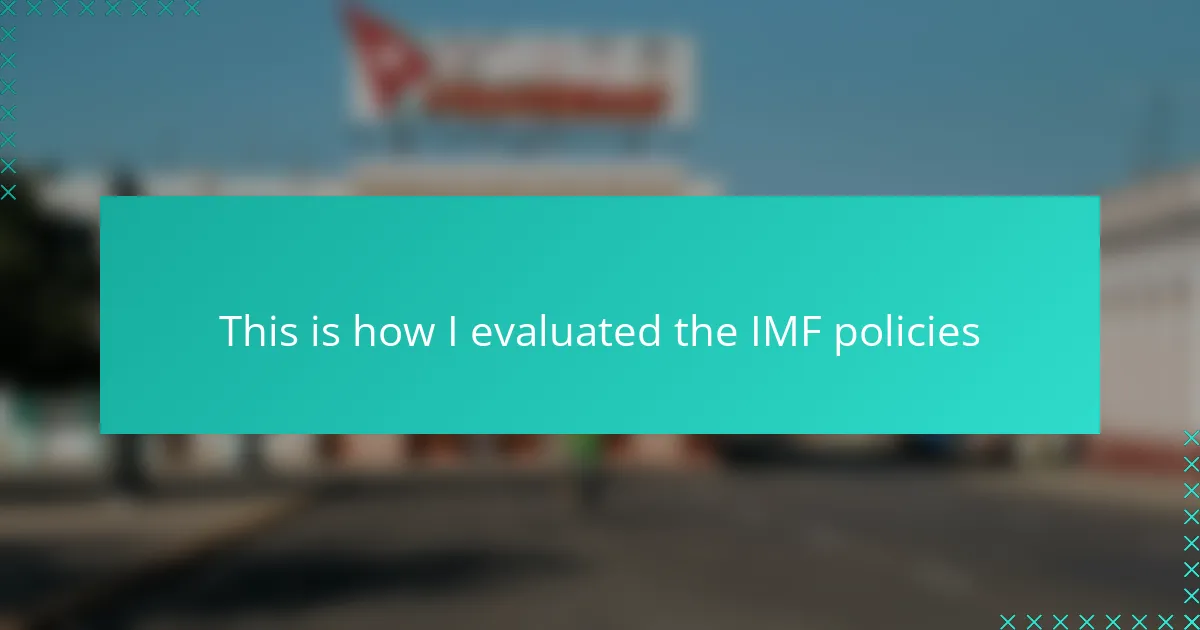Key takeaways
- IMF policies strive for global economic stability through financial support with conditionality, balancing support with necessary reforms.
- Continuous surveillance of economies aims to identify vulnerabilities but can feel intrusive to nations, highlighting the tension between oversight and sovereignty.
- Evaluating IMF actions requires consideration of both quantitative metrics and qualitative insights to capture the full impact on local communities.
- Flexibility and adaptability in policies are crucial for addressing each country’s unique context, emphasizing the importance of listening to local voices in assessments.
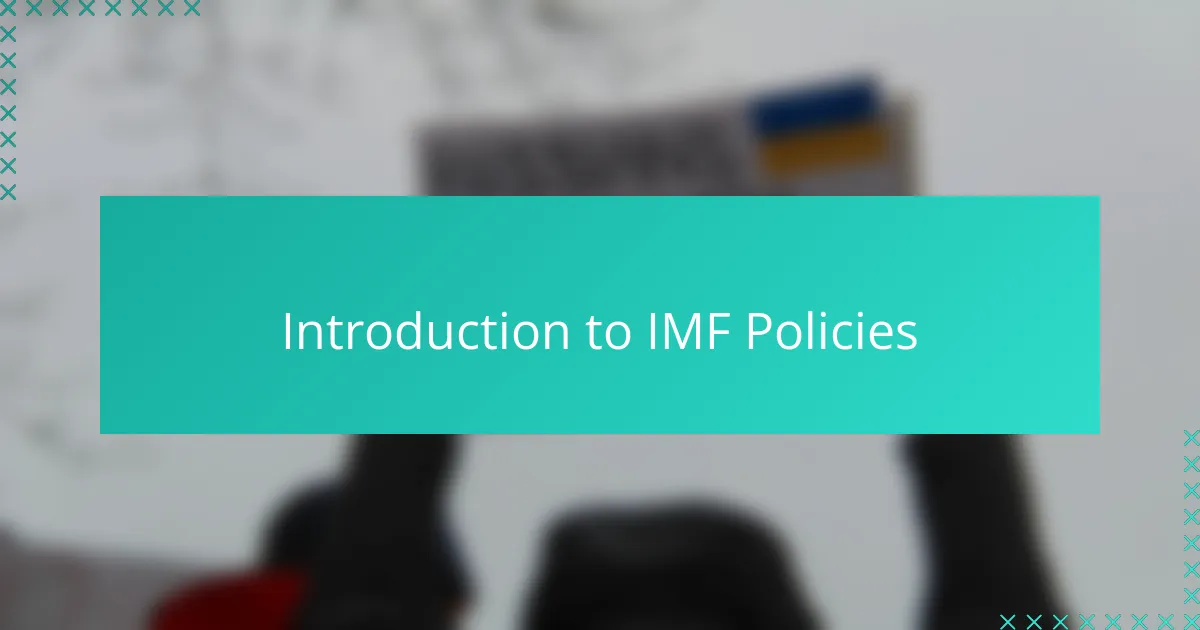
Introduction to IMF Policies
When I first encountered IMF policies, I was struck by how they aim to stabilize global economies through financial support and policy advice. But have you ever wondered what drives these policies, and whether they truly serve the countries in need? Reflecting on my experience, I realized that understanding the balance between economic assistance and imposed conditions is key to evaluating their real impact.
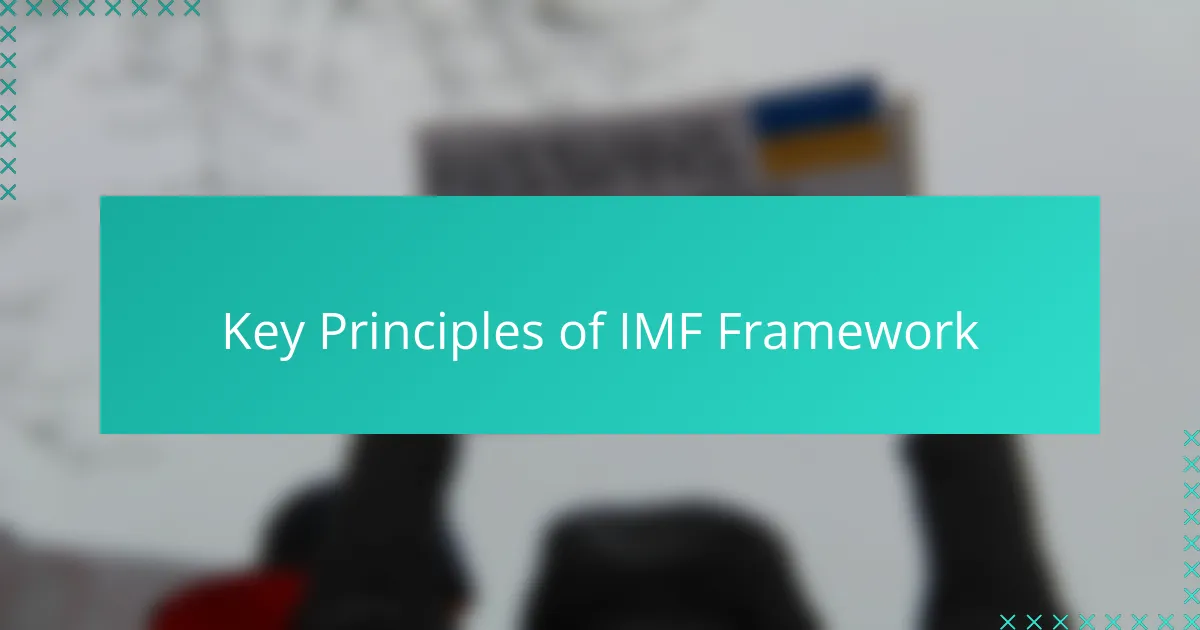
Key Principles of IMF Framework
What really stood out to me about the IMF framework is its foundation on financial stability and economic growth. It’s designed around principles like conditionality, where countries receive support but must commit to certain reforms. At first, I questioned whether these conditions help or hinder development, but I soon saw that the IMF believes these rules ensure responsible use of funds.
Another principle that caught my attention is the emphasis on surveillance. The IMF doesn’t just hand out money; it continuously monitors economies to detect vulnerabilities early. I’ve found this approach both reassuring and frustrating—reassuring because it aims to prevent crises, but frustrating because it can feel intrusive to sovereign nations.
Lastly, there’s the element of global cooperation embedded in the framework. Isn’t it fascinating how the IMF tries to balance the interests of diverse countries? From my perspective, this principle underscores the challenge of crafting policies that are fair yet effective across vastly different economic landscapes.
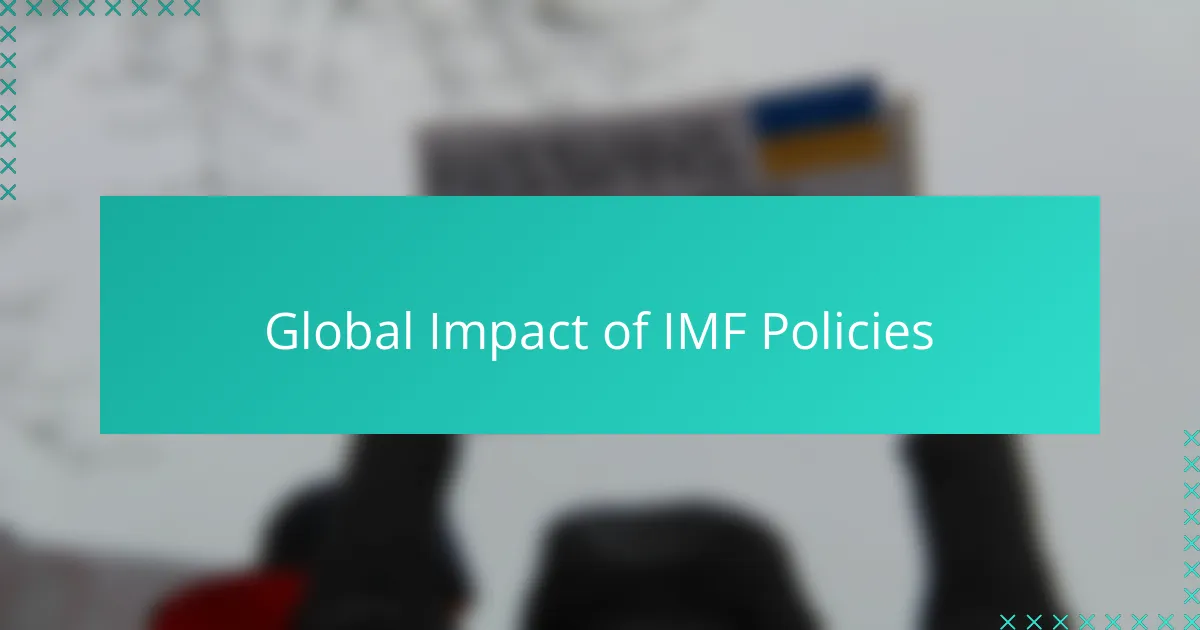
Global Impact of IMF Policies
When I analyze the global impact of IMF policies, one thing that stands out is how deeply they ripple across economies far beyond the immediate recipients. It’s almost like watching a stone tossed into a pond—the initial splash might be local, but the waves travel wide. I often wonder, though, whether these waves always help to calm economic turbulence or sometimes stir up new challenges elsewhere.
From my experience, the conditionality tied to IMF assistance makes a huge difference globally. Countries promising reforms often undergo painful adjustments that affect not just governments but everyday people. I can’t help but feel conflicted—while these policies aim to foster long-term stability, the short-term social costs can be significant. Have you noticed how this dynamic often sparks debates about fairness versus effectiveness?
Another aspect I find fascinating is how IMF policies influence global cooperation, sometimes creating tension between national sovereignty and collective economic goals. It reminds me of a time I discussed these policies with colleagues who worried that the IMF’s role can occasionally feel like external control rather than partnership. This tension reveals just how delicate and complex the IMF’s global impact really is.
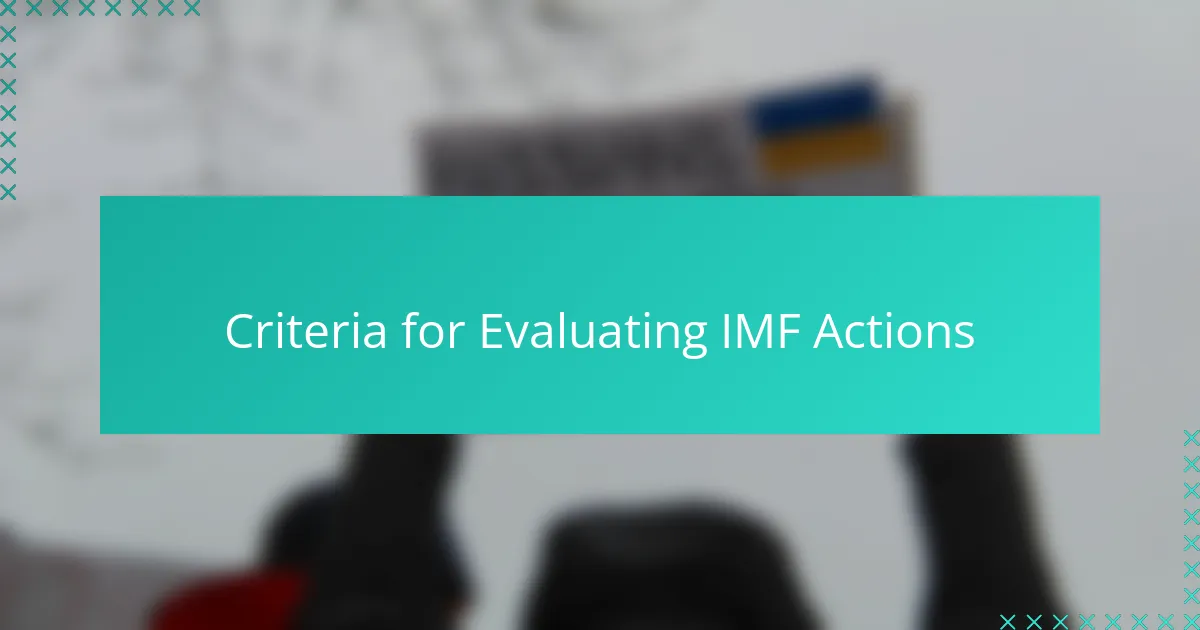
Criteria for Evaluating IMF Actions
When I set out to evaluate IMF actions, the first thing I considered was their effectiveness in achieving stated goals like economic stability and growth. I asked myself: Are the policies actually helping countries recover, or are they just shifting problems around? This focus on tangible outcomes became a crucial lens through which I interpreted the data and reports.
I also paid close attention to how the IMF balances conditionality with respect for national sovereignty. It struck me that while strict conditions might ensure fiscal discipline, they can also feel like a heavy-handed imposition. From my experience, understanding this delicate balance helped me appreciate why some nations resist certain reforms, even when those reforms might bring long-term benefits.
Lastly, I couldn’t ignore the broader implications, such as social impact and political feasibility. Have you ever wondered how IMF policies affect everyday people, beyond the economic statistics? Reflecting on feedback from local communities in countries I studied, I realized that assessing IMF actions isn’t just about numbers—it’s about the human stories behind those numbers. This multidimensional criteria made my evaluation far richer and more nuanced.
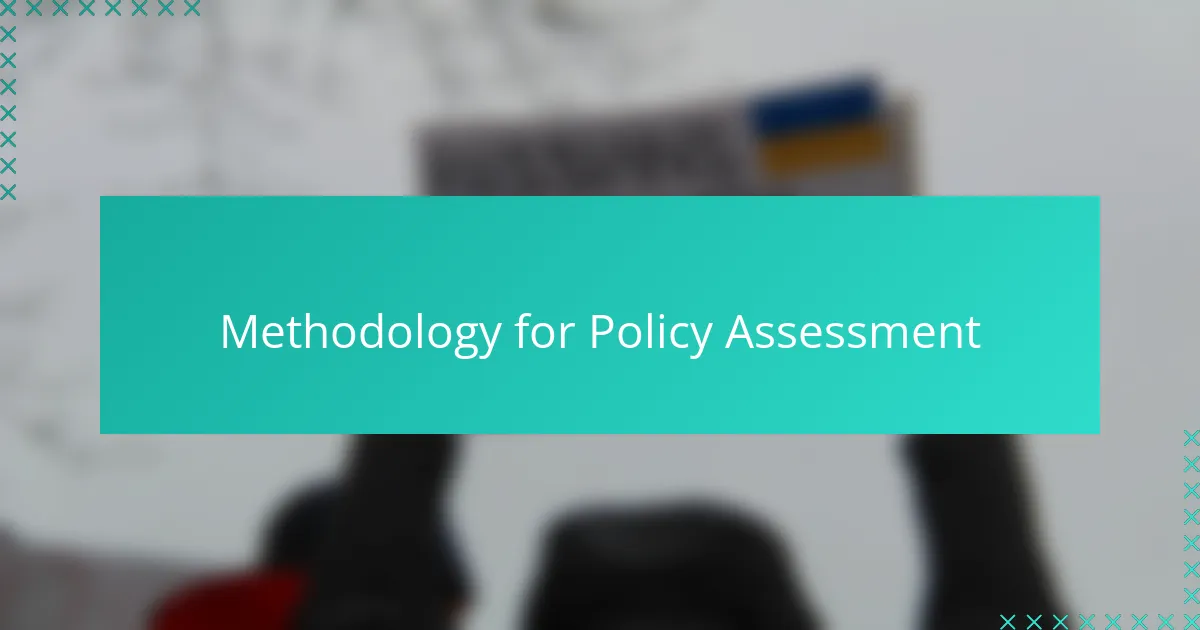
Methodology for Policy Assessment
To get a clear picture of how IMF policies actually work in practice, I started by defining specific benchmarks—like economic recovery rates and fiscal discipline—that I could measure objectively. But I quickly realized that numbers alone don’t tell the whole story. Have you ever tried to assess a policy’s success purely through data and felt something was missing? That’s when I began blending quantitative analysis with qualitative insights, like expert interviews and country case studies, to capture the full scope.
I also made a point to track how the policies evolved over time, knowing from experience that initial outcomes rarely reveal long-term effects. It felt important to examine not just what the IMF intended, but how those policies played out amid shifting political and social landscapes. This time-sensitive approach helped me connect policy intentions with real-world consequences—and believe me, those connections aren’t always straightforward.
Finally, I considered the feedback loop between the IMF and member countries. Listening closely to local voices gave me a sense of how policies were perceived on the ground, beyond official reports. Isn’t it fascinating how the same policy can be hailed as a lifeline by some and a burden by others? This part of my methodology reminded me that evaluating IMF policies means navigating complex perspectives—and that challenge made the entire process all the more rewarding.
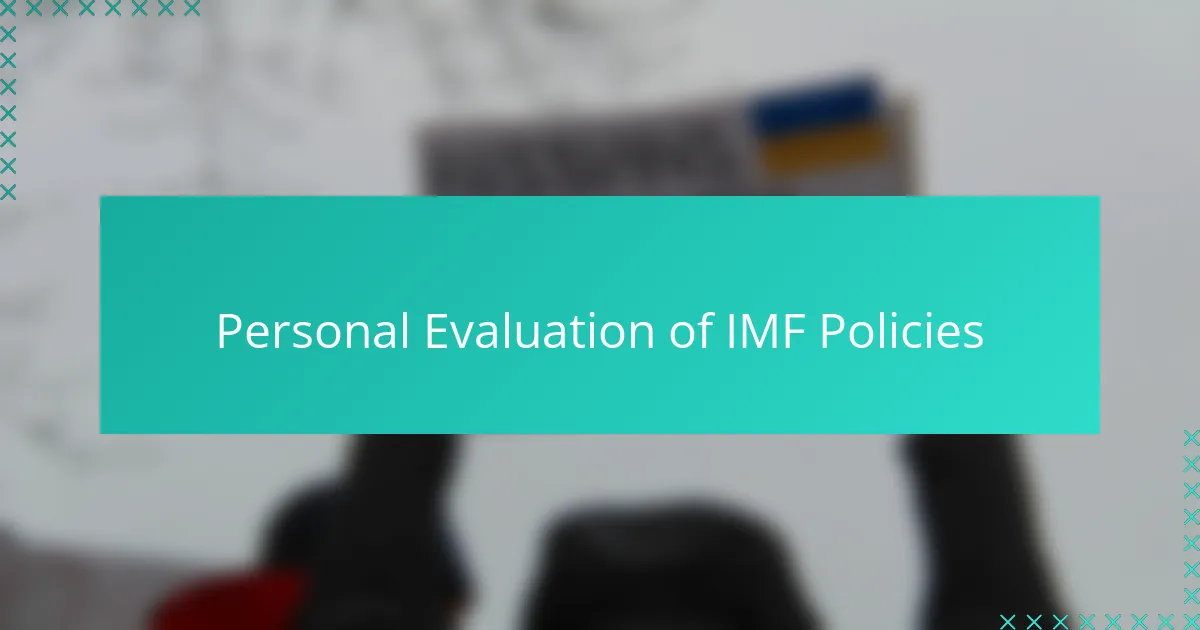
Personal Evaluation of IMF Policies
When I finally sat down to critically evaluate IMF policies, I realized just how challenging it is to separate intent from impact. I found myself asking: Are these policies genuinely fostering sustainable growth, or do they sometimes prioritize financial metrics over people’s lived realities? From my experience, the answer isn’t black and white—it’s a constant balancing act between economic theory and human consequences.
I also reflected deeply on the role of conditionality, which initially felt to me like a double-edged sword. While these conditions can enforce much-needed discipline, I’ve seen firsthand how they can amplify hardships for vulnerable populations. This made me question whether the IMF could do more to tailor its approach, respecting each country’s unique social and political context.
Finally, what struck me most was the importance of listening to diverse voices on the ground. I recall conversations with locals in countries under IMF programs—some viewed the assistance as a necessary lifeline, while others felt powerless under the imposed reforms. This personal insight convinced me that any evaluation of IMF policies must go beyond statistics and truly consider the human stories behind the numbers.
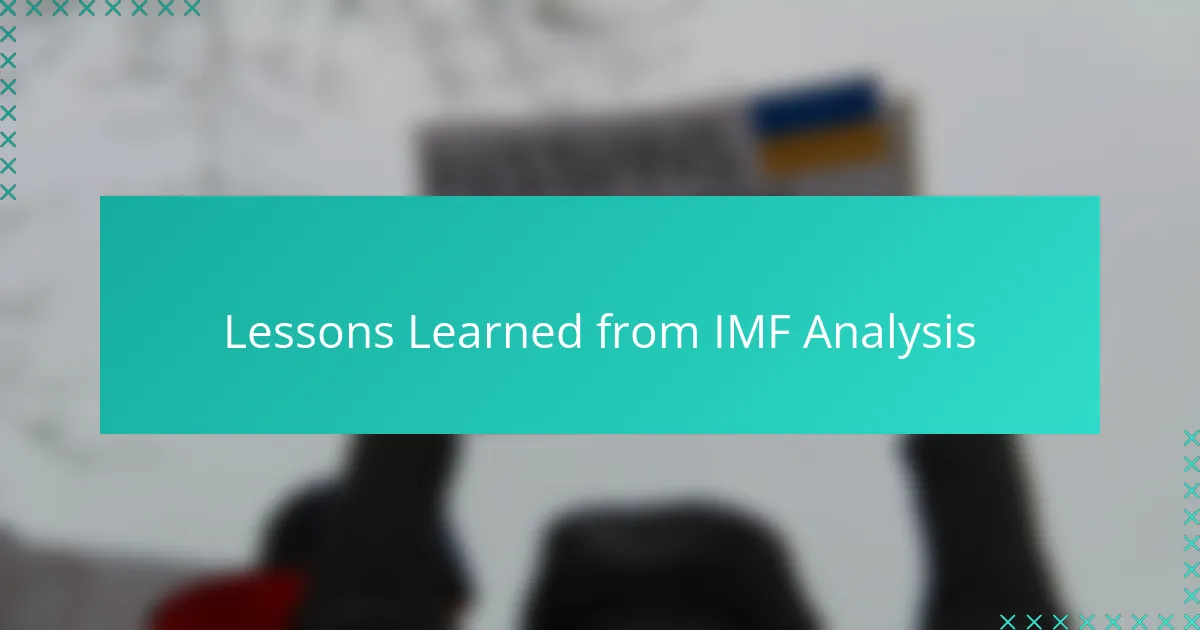
Lessons Learned from IMF Analysis
Looking back on my IMF analysis, one lesson that stands out is how critical it is to balance economic discipline with empathy. I often found myself questioning whether strict fiscal conditions were helping countries heal or inadvertently deepening social wounds. Have you ever noticed how policies, no matter how well-intentioned, can sometimes miss the human nuances beneath the data?
Another insight that stayed with me is the importance of adaptability. Early in my evaluation, I assumed IMF policies followed a one-size-fits-all formula. But over time, it became clear that flexibility—or sometimes the lack of it—makes a huge difference in outcomes. It made me wonder: Could better tailoring to each country’s unique context change the narrative from resistance to collaboration?
Finally, I learned that listening is everything. Through conversations with people living under IMF programs, I realized that the real impact of policies often unfolds far from official reports. Those firsthand perspectives challenged me to see beyond numbers and charts, reminding me that behind every statistic is a story worth understanding. Wouldn’t you agree that evaluation isn’t complete without those voices?
